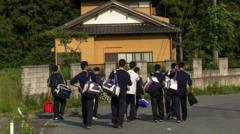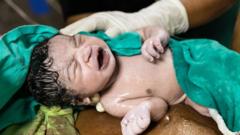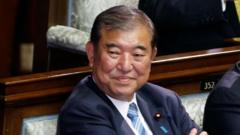Recent statistics indicate that a staggering 80% of Japanese teenage boys and over 25% of girls have yet to experience their first kiss. Experts attribute this decline to pandemic-related restrictions while highlighting an alarming trend of decreasing sexual activity among youth. The implications of these findings extend to Japan's already low birth rate crisis.
Japan's Teenagers Facing Love Challenges: Record Low First Kisses

Japan's Teenagers Facing Love Challenges: Record Low First Kisses
A new survey reveals that Japan's teen boys and girls are experiencing unprecedented delays in romantic milestones, raising concerns about future birth rates in the country.
In many cultures, a first kiss symbolizes a pivotal moment in teenage life, an initiation into romance that shapes future relationships. However, a recent survey conducted by the Japan Association for Sex Education (Jase) has unveiled a concerning trend in Japan. It highlights that four out of five boys aged 15 to 18 have yet to experience their first kiss, with a similar situation for girls, where only a little over one in four have shared this intimate moment. These figures represent the lowest recorded since the surveys began in 1974, raising alarms in a nation grappling with one of the world’s lowest birth rates.
Across a sample size of 12,562 students from junior high to university levels, the survey covered a broad spectrum of topics related to sexual activity, from first kisses to sexual intercourse. The data indicated that the decline in first kisses is part of a larger trend; the ratio of high school boys who reported having had sexual intercourse has fallen to a mere 12%, a drop of 3.5 points since 2017. For girls, this figure decreased even further to 14.8%, with a 5.3 point decline during the same period.
Experts suggest that the COVID-19 pandemic has significantly influenced these trends. School closures and strict restrictions on physical interaction occurred during crucial developmental stages for many students, effectively stalling natural explorations of sexual and romantic interest. Yusuke Hayashi, a sociology professor at Musashi University, noted that this sensitive timing likely curtailed teenagers' experiences in initiating romantic connections.
Interestingly, while first kisses and sexual activity have declined, there has been a notable increase in teenagers admitting to masturbation, with figures hitting record highs. This juxtaposition may indicate shifts in how young people are developing their sexuality amidst changing social norms and constraints.
These alarming trends surface in a context where Japan’s low birth rate is a pressing concern. Recent data indicates that nearly half of all marriages in Japan are sexless, and predictions suggest the nation's population, currently around 125 million, could dwindle to less than 53 million by the turn of the century. The former Prime Minister has expressed fears that such demographic shifts could undermine Japan's ability to function effectively as a nation.
Other contributing factors to the low birth rate include rising living costs, increased educational and career opportunities for women, and accessible contraception leading to delayed family planning. With Japan already recognized as having the world's oldest population, with 10% of its citizens now aged 80 or older, the nation faces a critical juncture.
In a striking move emblematic of the changing needs, Oji Holdings, a diaper manufacturer, announced plans to cease production of baby diapers in favor of adult diapers. This shift underscores the gravity of the demographic challenges Japan faces as it grapples with its future in a rapidly changing societal landscape.
Across a sample size of 12,562 students from junior high to university levels, the survey covered a broad spectrum of topics related to sexual activity, from first kisses to sexual intercourse. The data indicated that the decline in first kisses is part of a larger trend; the ratio of high school boys who reported having had sexual intercourse has fallen to a mere 12%, a drop of 3.5 points since 2017. For girls, this figure decreased even further to 14.8%, with a 5.3 point decline during the same period.
Experts suggest that the COVID-19 pandemic has significantly influenced these trends. School closures and strict restrictions on physical interaction occurred during crucial developmental stages for many students, effectively stalling natural explorations of sexual and romantic interest. Yusuke Hayashi, a sociology professor at Musashi University, noted that this sensitive timing likely curtailed teenagers' experiences in initiating romantic connections.
Interestingly, while first kisses and sexual activity have declined, there has been a notable increase in teenagers admitting to masturbation, with figures hitting record highs. This juxtaposition may indicate shifts in how young people are developing their sexuality amidst changing social norms and constraints.
These alarming trends surface in a context where Japan’s low birth rate is a pressing concern. Recent data indicates that nearly half of all marriages in Japan are sexless, and predictions suggest the nation's population, currently around 125 million, could dwindle to less than 53 million by the turn of the century. The former Prime Minister has expressed fears that such demographic shifts could undermine Japan's ability to function effectively as a nation.
Other contributing factors to the low birth rate include rising living costs, increased educational and career opportunities for women, and accessible contraception leading to delayed family planning. With Japan already recognized as having the world's oldest population, with 10% of its citizens now aged 80 or older, the nation faces a critical juncture.
In a striking move emblematic of the changing needs, Oji Holdings, a diaper manufacturer, announced plans to cease production of baby diapers in favor of adult diapers. This shift underscores the gravity of the demographic challenges Japan faces as it grapples with its future in a rapidly changing societal landscape.






















